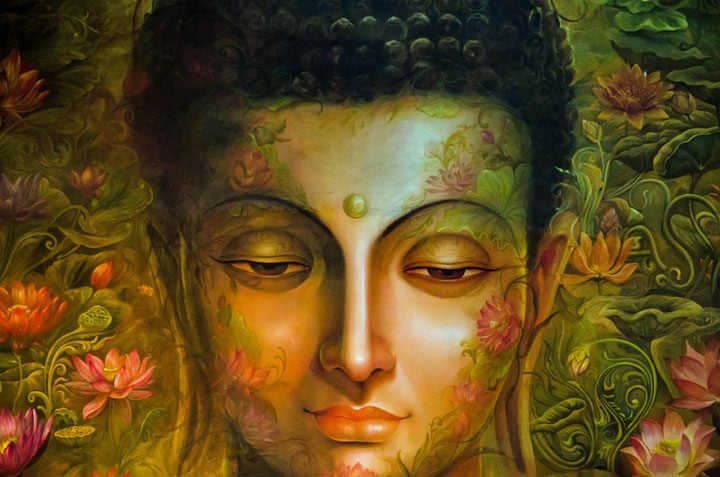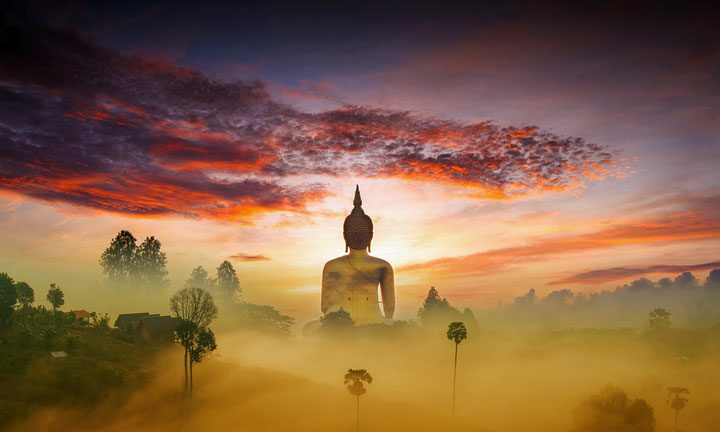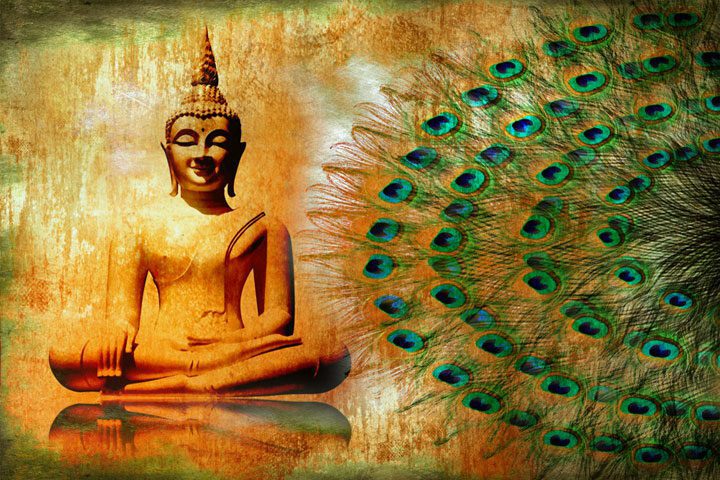
Under the Bodhi tree in Gaya, the Buddha attained enlightenment and soon afterwards proclaimed what he himself called the Four Noble Truths.
- There is first of all the Noble truth of Dukkha (suffering).
- Then there is the Noble Truth of The Cause of Dukkha.
- Third, there is the Noble Truth of stopping Dukkha.
- And fourthly, there is the Noble Truth of the Path leading to the stopping of Dukkha.
Of the first, the Buddha said: “This, O bhikkhus, is The Noble Truth of Dukkha (i.e. Suffering). Birth is Dukkha, decay is Dukkha, death is Dukkha, sorrow, lamentation, pain, mourning, sadness and despair are Dukkha. Being with people you don't love, being separated from people you love, that's also Dukkha, Not getting what you want is also Dukkha”. And he went on to say that impermanence, changes that are unavoidable, is also Dukkha. Every earthly happiness, the joys of family life, the gladness of friendship, with changing circumstances turns into the bitterness of Dukkha.
The ax of impermanence is always at the foot of the tree of joy.
About the second Noble Truth, he said: “What is the Noble Truth of the cause of suffering? It is this 'desire', which leads from one birth to the next, which is accompanied by pleasure and greed, which finds pleasure again and again, everywhere. This longing, this sigh, is the great driving force behind all the actions of the deceived people, now this way, now that way.
All Dukkha is rooted in this selfish desire for worldly things, in this excessive attachment, this passionate dependence, which is also called “Tanha” in Pali (language). And in the word Tanha is the concept of selfishness, and it is this selfishness that causes all misery. If the sigh is given in to, more 'sigh' will follow. It is a dangerous 'compulsion' it is responsible for all the evil things in life.

This speaks for itself when we talk about the underlying motives of the murderer, the thief. Why does someone become jealous of someone else's success. Clearly there is selfish desire there. Self-love makes one look at things from one's own point of view and is unable to see the other's point of view.
And then the love of the lover for his beloved, that too is a form of selfishness. The love of the lover is seldom an unselfish love. It is a love that craves recognition and it wants to receive something in return. In short, it comes from self-love. The man in love is out to please himself, and love for the other is self-love in disguise. How else can love turn to hatred so quickly and easily, as sometimes happens when love is rejected.
The third Noble Truth implies, as a logical consequence of the second, that if the 'desire', the 'sigh' can be released, the Dukkha will come to an end.
And with the fourth Noble Truth, the Buddha shows the way, a way of life, which brings about a complete cessation of Tanha's urge.

Only when we are deeply convinced that all life is a form of illness, that all life is Dukkha, then we will welcome any suggestion to escape Dukkha. Therefore, the "Noble Eightfold Path" does not appeal to everyone. For some not at all, for others only a little. And for a few, walking this path is inspiring and full of joy that later leads to a deep, spiritual experience.
To know this truth the Path must be walked. This contains a carefully and wisely composed group of ingredients that are necessary for the spiritual development of people. Every Buddhist knows them:
- correct understanding
- right thought
- speak the right words
- act right
- right effort
- right consciousness
- correct concentration
These eight factors are the essence of the ideal Buddhist life. It is a carefully considered program of purification of thought, word and deed, ultimately resulting in a complete disappearance of the Craving. The origin of the “Supreme Wisdom.
From: The Significance of the Four Noble Truths, by VF Guaratne, The Wheel Publication No 123
Submitted by Thijs


What a clear and pure explanation, especially now during the Christmas days.
I wish you all such a pure and noble way of life.
A spiritually pure 2019.
excellent explanation of the core and actually lesson 1 if you start to study the dharma [doctrine].
that 8-fold path to enlightenment, which is often depicted as a wheel with 8 spokes and you often see it in mandalas, you must then transform into a daily practice of mainly meditation.
the goal of the Buddhist is to achieve enlightenment, but they prefer to speak of awakening, which fits better with the process towards it.
after all, it is about “letting go” and the path is the goal, all this to avoid performance behaviors that are counterproductive precisely because we are attached to those worldly things.
I myself am a down-to-earth modern emancipated man who until now has been concerned with Western perception and is more concerned with what I myself call the "scientific side" of Buddhism.
a few years ago I reached a certain degree of enlightenment, but in a Western lifestyle with all the achievement-oriented and materialistic around you, it is difficult [but not impossible] to maintain this.
all in all I can recommend it to everyone to start meditating, it just takes concentration and you can just sit on a chair [I do] and you will soon experience the benefits and effects that go beyond what you expected!
what you see in thailand has more to do with animism and it is further mixed with hinduism and jainism.
yet if you understand Buddhism better you also understand better how a Thai thinks and reasons is my experience, although of course there are gradations and levels, but that is also the case with us!
Hi Harry.
Not only is the goal of the Buddhist to achieve enlightenment that applies to every human being. Whether or not you're a Buddhist or don't believe at all, it doesn't matter what your belief is on that point. I've been meditating for 20 years and if you say I've reached a certain degree of enlightenment but can't hold it then you still have a long way to go. And if you approach enlightenment from a scientific point of view, then you are completely wrong and you are still in its infancy, because spirituality has nothing to do with science at all. Spirituality has to do with the fact that you can detach yourself from earthly matters and are no longer bound by the illusion that everything you see is real. And yes Thailand has to do with animism, but that is a very limited part of Thailand that believes in it. I completely agree with you that spirituality starts with a routine every day to meditate for at least half an hour. That's good for everyone to do.
info : about The Blue-Eyed Buddha can be found Link – ROBERT SEPEHR https://atlanteangardens.blogspot.com/2014/05/the-blue-eyed-buddha.html
Hidden behind every major religion and tradition lies a secret, fiercely guarded throughout history, always completely forbidden to reveal this mystery to the public. Since ancient times, the symbolic worship of the serpent has been seen in cultures worldwide, and it was often given a similar meaning, widely accepted as a symbol of divine wisdom and spiritual purity. The secret of SEX ENERGY for / enlightenment transforming life force. SEE VIDEO: The Mystery of Adam and Eve – ROBERT SEPEHR https://www.youtube.com/watch?v=gY1GBOnQe7o
Prana, Chi, Orgone, Vril, are all similar words used to describe life force, or bio-magnetic energy. Mantak Chia, an expert in Taoist philosophy, is one of the first to reveal to the West secret Taoist traditions and techniques, which were carefully guarded for many millennia by emperors, high priests, pharaohs and other elite.
Energy Transmutation and the Way of the Tao: https://www.youtube.com/watch?v=wtNYOj5yptI
Deep down everyone knows that I think, at least when they are ready to face this full truth. But then there is still a long way to go, even if you realize that this is the way to end suffering. Are you really going for it or not? Or do you stay stuck in the circle of Karma, because you choose your own “selfishness” again? As Christ said, it is easier for a camel to pass through the eye of a needle than for a man to reach the kingdom of heaven. If it was all that easy, everyone would already be enlightened today, right? I'm still a seeker in the "selfish" desert at that point with a hint of how it could be otherwise. It is for every human being to reach the kingdom of heaven, but only a few actually reach it. Up to now. What I do miss in this beautiful message. He talks about 8 ingredients and I only read 7. What is message nr 8 then?
Just like Simon the Good (he really understood the message), I wish everyone a development on their own spiritual level that suits them. Ps Christmas has been relegated to a decadent celebration with commerce reaching an all-time high this year as the economy is a bit better than in recent years. More money has never been spent than this year on superfluous luxuries and extravagant food. What was the original Christmas message again? Unfortunately, many don't even know that anymore. Today's Christmas message is spend as much money as possible on things you would otherwise never buy because they are too expensive. And almost everyone participates in it. Sad but true.
not being able to hold on to that has to do with the lack of the right focus, so not “acting right” which is not so bad because with a new right focus, the process just continues.
that scientific thing I mean has to do with ancient insights that were recognized and established as scientific much later here in the west.
for example, Buddhism has also been tested against quantum physics and is sometimes referred to as "eastern psychology".
I can imagine that people see Buddhism as spiritual, but I think that if you strip it of that, you make it much more concrete and understandable for anyone who wants to walk that eightfold path to enlightenment and has to shape it in everyday practice .
that is why it is not a religion but a philosophy or worldview and at least for me to understand so far.
yet I leave open the possibility that contemplation [worship] and meditation ultimately led to the same thing.
the nirvana or heaven it is a very personal feeling and experience i think.
it is clear that materialism leads to nothing but only to the 6th extinction and for the time being a large part of humanity continues to "whirl around" in samsara and follow its desires all its life.
If I were to describe the feeling of enlightenment, it resembles a state of being in which one feels completely free and experiences unprecedented happiness in which the simplest and smallest things seem very valuable, a kind of permanent mental orgasm.
I have this most in free nature where there is pure energy and I come into contact with cosmic and terrestrial radiation.
I am convinced that this can purify our etheric body [energy body] and contribute to the healing of diseases and disorders.
Hi Harry,
I totally agree with this. Buddhism is indeed not a religion but a philosophy of life. I know the moments of unprecedented happiness. It feels like everything is good that is happening around you and you are connected to everything around you. Unfortunately, those are sporadic moments for me. It's gone again too. Most diseases arise from the imbalance of the etheric body and from there the body itself also becomes ill.
Dear Hans,
Thank you to all those attentive readers!!
My apologies, I did indeed skip a part of “The Path”. Probably unconsciously, perhaps suppressed because it is a “guideline” that is difficult to summarize in a few words.
It is about guideline 5 in the series and roughly translated it is: the right way of livelihood. In Pali it says Samma Ajiva and the writer Gunaratne translated that with “right livelihood”. The concept is described in Thai as: giving a correct execution and substance to your honorable and honest profession, whereby you do not cut off or get in the way of the other person.
This ties in (of course) with the five commandments for 'every day' living:
- don't kill
- do not steal
– no adultery
- do not lie
– do not use narcotics or intoxicants (keep your head clean)
As an aside, Christmas was invented by the Christian Religious, who integrated the festival of the return of light (the Sun) with the birth of Christ. Who, by the way, was born in October, if the annals are interpreted purely….
Jokingly one may perhaps see it this way, that we go back to the origin of the party with lots of lights, and are happy (that the sun has decided to come back again) and presents and good food.
Many thanks for your response!!
Thijs
awesome! I didn't know there were people like that on the blog. I read those comments twice.
I thank you all very much for your responses and of course the writer of this article.
These forms of desperation have occupied mankind for thousands of years on the wrong foot: not solving the problems, but learning to accept (= to sink into resignation) . No, just roll up your sleeves.
Good story, Thijs! As far as the Noble Eightfold Path is concerned, the question remains what is 'right' and 'not right'. For example, the Buddha stated that women should be subordinate to men. I think the Buddha's call for independent thinking in the Kalama Sutta is very important. Don't believe everything monks and teachers say. The Buddha was sometimes emotional. He enjoyed a nice meal and beautiful nature. He was very angry when he found unkempt monks in a temple.
no, harry romijn I don't really see the connection with what you suggest.
of course there will be people who have such an attitude and behavior and you will often find them in the ”basic bottom layer” that is people who see Buddhism as a kind of trendy lifestyle complete with meditation mat and Buddha statues. that is why Buddhism in the Netherlands is also growing in breadth but not in depth.
the Buddhist teachings and meditation offer the opportunity to develop yourself in a positive way and to get a more clear and objective view of things, so that you can deal with problems better and be more decisive.
Unfortunately, due to a lack of proper perception and practice, Buddhism has acquired a woolly image among a certain group of people, partly due to people who have enriched themselves and pretend to be guru.
You will of course find this in all religions and philosophies of life.
For those interested in Buddhism brought in the English language by Ajahn Brahm
One of the highest ranked monk trained in Thailand.
His countless videos are very inspiring with humor at times.
Buddhist Society of Western Australia
YouTube Jun 24 2565 BE